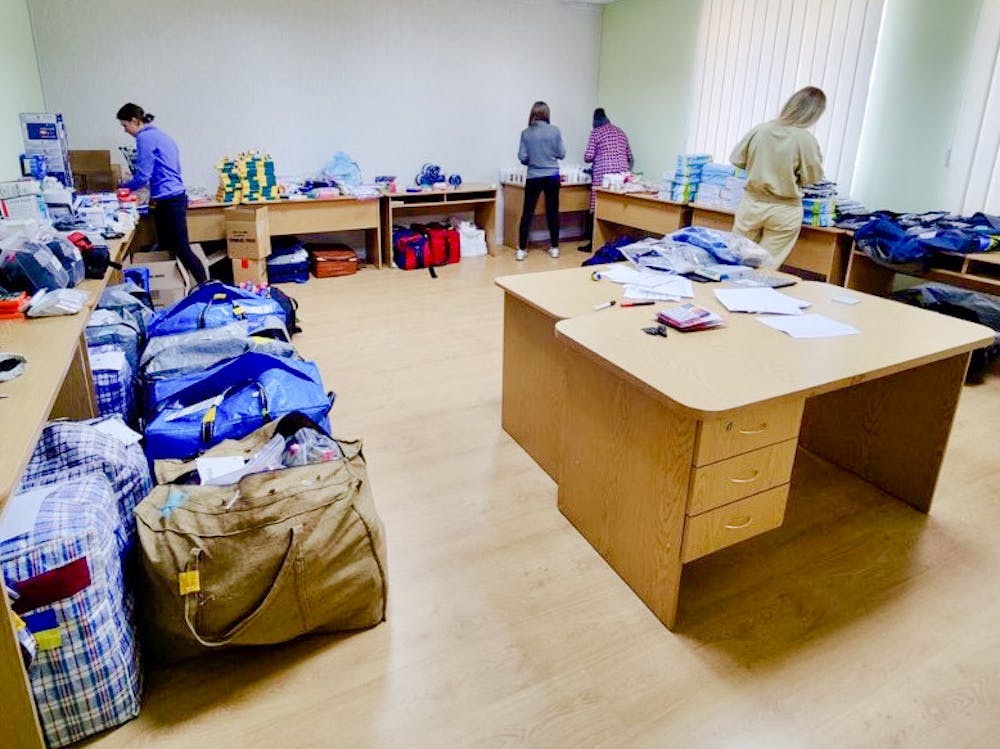On Feb. 24, Mariya Bachmaha MPH ’16 woke up at 6 a.m. in her hometown of Lviv — a city in Western Ukraine — to news of Russia’s invasion. Bachmaha was initially shocked by the news, as well as worried about her family’s safety and the possible consequences of such a conflict. But once the initial shock wore off, she immediately mobilized.
“I was part of the volunteer movement collecting equipment for the army and medicines for hospitals” during the 2013-2014 Euromaidan Revolution and 2014 Russian annexation of Crimea, Bachmaha wrote in an email to The Herald. Reviving these past connections “was more or less organic.”
Bachmaha reached out to volunteer groups in Lviv and began identifying the immediate needs of Ukrainian citizens and collecting tactical medical supplies for the army and new recruits. She then called on her closest contacts in Rhode Island for help, emailing them a list of the most-needed medical supplies.
“I knew that all of my friends are a great resource — they have connections in health care — and I knew they (could) indeed help Ukraine,” Bachmaha wrote. “I knew (this) would be the most productive and effective way for my friends in the U.S. to collaborate and start helping rather than helplessly reading the news.”
The initial group that received Bachmaha’s email included Natasha Rybak MD ’07, assistant professor of medicine; Anthony Levitas, senior fellow in international and public affairs; Maya DeHart, who had previously stayed with Bachmaha’s family in Ukraine as a part of the Rotary Youth Exchange program; and Michael Kennedy, professor of sociology and international and public affairs. The next day, the group founded Friends of Ukraine R.I. and set up a Fundly page to field donations from the local Rhode Island community.
The campaign has raised $104,901 at the time of publication and has directed the donations “towards emergency medical equipment for the front lines, such as paramedic backpacks, medical splints, antibiotics, sterile wipes, thermal blankets, tourniquets, IV systems, bandages and dressings and shields for evacuating the injured,” according to the Fundly page.
Bachmaha “spurred us into action,” DeHart said. The day after receiving her email, “we had a name, we had a fundraising site and we were reaching out to all of our personal contacts.”
While most “humanitarian aid is ultimately provided by governments, … the role for our kind of effort is to get aid to people who might not (normally) get it and can’t wait,” Levitas said. “We’re trying to plug the gaps.”
One way the group provides aid is by working with Peace Corps volunteers like Andriy Chybisov MPH ’17, former program manager at Peace Corps Ukraine, to field direct cash relief requests from Ukrainian citizens.
“Using a network of trusted former Peace Corps people, (we) have been calling into contacts all over Ukraine and asking ‘who needs what’ and ‘what can cash buy,’” Levitas said.
“We are trying to keep no more than one degree of separation between the requester and the beneficiary,” Chybisov said. These requesters include former co-workers of group members or people that run larger organizations in Ukraine that offer broader community support.
“This cash relief opportunity is a lifeline” for many Ukrainians, Bachmaha wrote.
While the group ensures that the people who need aid the most get it immediately, Chybisov explained that there are certain limits “about how much cash we can disperse in one sitting.”
“It just needs to be an amount that makes a difference for an individual,” he added.
Friends of Ukraine R.I. typically sends up to $500 to individual Ukrainians, but this limit can fluctuate based on specific exceptions, Levitas said.
“We are trying to focus more on community groups — not necessarily organizations,” Chybisov said. “If you buy an electric generator for a community group, hundreds of people will benefit from it.”
These groups can include those “that have emerged on the grassroots level, like the self-defense groups,” he added. “They are civilians. … They need to be fed, they need to have some warm clothing.”
The organization is also collaborating with various medical groups around Rhode Island — including nurses, doctors and medical suppliers — to help source more difficult-to-acquire medical supplies such as wound care kits and mini-ultrasound machines, an effort led by Rybak.
Once these medical supplies are acquired, the group works with civilian networks to transport them to Ukrainian front lines, DeHart said.
“We are finding that a lot of aid is getting backed up — there are these bottlenecks,” DeHart added. “I think civilian grassroots networks are the best way we found to get (supplies) … to the frontlines quickly and around these bottlenecks.”
Slavik Krishchuk, a Ukrainian American ICU nurse in Providence, is leading one such civilian network through the Second Baptist Church of East Providence.
Through this network, a Rhode Island volunteer flew to Warsaw, Poland and transported emergency supplies through check-in bags, according to a newsletter sent out to Friends of Ukraine R.I. donors and reviewed by The Herald.
Supplies were then transferred to Ukrainians who received “special permission to leave the country in order to transport aid to and from the border,” according to the newsletter. The supplies were then relocated to local churches in Lutsk, Ukraine and distributed by the territorial defense on the frontlines in eastern Ukraine.
Through Levitas’s connections with the Polish community around Rhode Island and close ties to the Association of Polish Cities, Friends of Ukraine R.I. is also “lining up with other couriers from the U.S. to Poland to Ukraine’s territorial defense,” DeHart wrote.
DeHart encouraged Rhode Island community members to continue supporting Ukraine not only by donating to the campaign but also by “spreading the word” about the conflict.
“A big part of (the group’s effort) is just keeping this in people’s consciousness,” DeHart said. “We live very far away, … so I think it’s just really important to keep this (conflict) in people’s hearts and minds.”
“We need to keep this (momentum) going,” Chybisov said. “We need to make sure we don’t forget that one of the largest countries in Europe is at war right now and that atrocities are happening.”
DeHart explained that the group’s reaction went “from shock to mobilization.” Now, she said, they’re “in campaign mode.”
“We’re in this until we win this,” DeHart added.
Bachmaha remains grateful for the efficiency with which Friends of Ukraine R.I. has managed to organize.
“I think my friends in Rhode Island (have) that fighting spirit that Ukrainians had to adopt in 2013-2014 and are perfecting now,” she wrote. “They are busy with solving immediate problems and needs and are using their energy for that rather than staying worried or devastated.”
“Having such an amazing group supporting us,” Bachmaha added, “makes this war far less hopeless.”

Alex Nadirashvili was the managing editor of multimedia and social media for The Brown Daily Herald's 133rd Editorial Board. As a former University News editor, he covered faculty, higher education and student life, though his proudest legacy is The Brown Daily Herald TikTok account.





